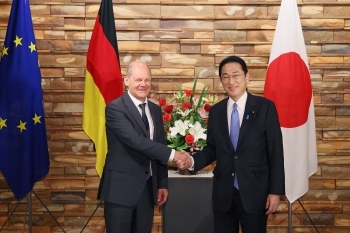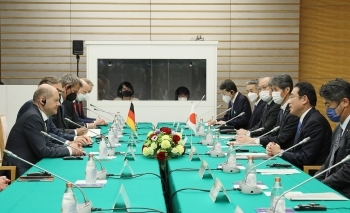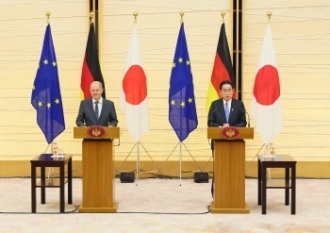Japan-Germany Relations
Japan-Germany Summit Meeting
April 29, 2022
 Two leaders who shake hands
(Photo: Cabinet Public Affairs Office)
Two leaders who shake hands
(Photo: Cabinet Public Affairs Office)
 Japan-Germany Summit Meeting
(Photo: Cabinet Public Affairs Office)
Japan-Germany Summit Meeting
(Photo: Cabinet Public Affairs Office)
 Joint Press Conference
(Photo: Cabinet Public Affairs Office)
Joint Press Conference
(Photo: Cabinet Public Affairs Office)
On April 28, commencing at 6:40 p.m., Mr. KISHIDA Fumio, Prime Minister of Japan, held a meeting with H.E. Mr. Olaf Scholz, Chancellor of the Federal Republic of Germany who was on an official working visit to Japan, for approximately 70 minutes, which included a tête-à-tête (one-on-one meeting). Commencing at 8:55 p.m., they also met over dinner for approximately 85 minutes. The overview of the meeting and dinner is as follows.
- Beginning
- (1) Prime Minister Kishida welcomed Chacellor Scholz’s choosing Japan as the first Asian country he visited, noting that this was a manifestation of the close Japan-Germany relationship. He stated that Japan and Germany are strategic partners sharing universal values. As the international community faces numerous difficult issues, he would like to discuss further strengthening bilateral cooperation and close collaboration under the G7 framework, since Germany is and Japan will be assuming the G7 presidency for this year and next year, respectively.
- (2) In response, Chancellor Scholz thanked Prime Minister Kishida for his welcome, expressing his desire for the two countries to cooperate as the G7 chair for this year and next year.
- Bilateral Relations
- (1) Security Cooperation and “Free and Open Indo-Pacific”
Prime Minister Kishida voiced great appreciation for Germany’s increasing interest and involvement in the Indo-Pacific, noting the dramatic deepening of security cooperation between the two countries, as evidenced by the signing of the Japan-Germany Agreement on the Security of Information, the holding of the Japan-Germany Foreign and Defence Ministers’ meeting (“2+2”), port call by a German navy frigate in Japan, and so forth. The two leaders also confirmed their intent for the two countries to continue close cooperation toward the realization of a “Free and Open Indo-Pacific,” including holding the second Japan-Germany 2+2 at an early date. - (2) Economic Security
Prime Minister Kishida explained that he attaches great importance to economic security, which is a priority issue he is working on. He said that bills aimed at enhancing economic security are currently being deliberated in the Diet. The two leaders concured that the two countries shall also cooperate in this area. - (3) Japan-Germany Cooperation in the West Balkans
The two leaders shared the view that EU membership is the best way for the West Balkan region to realize peace and prosperity based on universal values. They welcomed the implementation this month of the project for reconstructing community cente in southern Serbia through Japan-Germany cooperation and confirmed their intent to continue to promote bilateral cooperation. - (4) Launch of Inter-governmental Consultations
The two leaders concured to aim at launching a inter-governmental consultations by the prime ministers and cabinet ministers of both countries next year in order to promote bilateral cooperation in wide-ranging areas.
- International Affairs
- (1) Prime Minister Kishida stated that Russia’s aggression against Ukraine is an act that shakes the foundations of the international order. Japan is cooperating with Germany and other countries to impose severe sanctions on Russia and strengthen support for Ukraine. The security of Europe is also inseparable from that of the Indo-Pacific, and attempts to change the status quo by force is absolutely unacceptable anywhere in the world. Chancellor Scholz also agreed to the above points. The two leaders reconfirmed that it is important for the G7 to remain united and cooperate in their response. It was also decided that relief supplies donated by the Japanese people to the Ukrainian Embassy in Japan shall be transported on the German government plane with Germany’s cooperation.
- (2) The two leaders strongly opposed unilateral attempts to change the status quo by force in the East and South China Seas. They shared serious concerns about North Korea’s stepped up nuclear and missile activities and confirmed their continuous cooperation in responding to North Korea, including in dealing with the abduction issue.
- (3) With regard to climate change issues, Prime Minister Kishida explained that Japan is mobilizing all policy resources to work for achieving carbon neutrality by 2050, as well as meeting the ambitious 2030 target in compliance with this goal. The two leaders confirmed their intent to cooperate in working for the achievement of global carbon neutrality.
- (4) The two leaders also engaged in a candid exchange of views on Afghanistan, Iran, and other issues in regional and international affairs.

